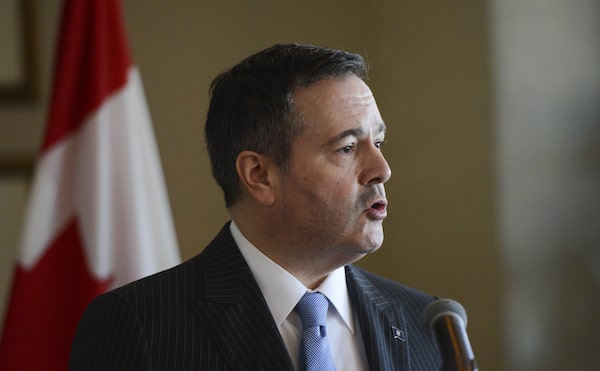
Alberta Premier Jason Kenney speaks at the Rideau Club in Ottawa on March 12, 2020.Sean Kilpatrick/The Canadian Press
An oil company is suing the Alberta government for $400-million, arguing public officials strung it along as it sought approval for an oil sands project while they worked behind the scenes to thwart the development.
It’s the second time Calgary-based Prosper Petroleum Ltd. has taken the government to court over its proposed Rigel project, which would produce around 10,000 barrels of oil a day near the Fort McKay First Nation, about 65 kilometres northwest of Fort McMurray. The project has had regulatory approval since 2018, but the Alberta government failed to give it the final green light it needs from cabinet before it can be built – the bone of contention at the heart of the first case.
Last year, the Alberta Court of Appeal sent the project back to the Alberta Energy Regulator, saying it should not have been approved because it would encroach on land the Fort McKay First Nation wants set aside for traditional use.
Now, in a statement of claim filed in the Alberta Court of Queen’s Bench last month, Prosper argues the Alberta government made “false, misleading, and inaccurate representations to Prosper,” failed to provide the company with information it knew would affect Rigel and attempted to influence the province’s regulatory decision-making process to delay the project.
The lawsuit comes as Premier Jason Kenney rails against U.S. President Joe Biden for cancelling a key permit for the Keystone XL pipeline, in which Alberta’s United Conservative Party government last year invested $1.5-billion and made loan guarantees. Mr. Kenney wants compensation for the money spent on pipeline construction and called on Ottawa to retaliate against the United States with trade sanctions.
Prosper chief executive Brad Gardiner told The Globe and Mail the company launched the case after a “frustrating” eight years of delays that would have brought royalties and jobs to the province.
“We look at all of that lost opportunity,” he said, adding he’s simply pursuing compensation for all the money he has sunk into the project – much like Mr. Kenney wants to do over Keystone.
“I’ve been in this business 40 years. I have never been treated like this by the government of Alberta,” Mr. Gardiner said.
The allegations have not been proved in court, nor will the Alberta government comment on the case.
The issue dates back to 2012, when Prosper bought land leases in Northern Alberta near Fort McKay and invested $60.4-million to develop the Rigel project.
Fort McKay is vocal in its support of oil development, but it says the community’s Moose Lake reserves are vital to its hunting, fishing and land treaty rights. The First Nation has been working with the province for 20 years to develop a protection plan for the area.
Around the same time that Prosper bought its leases, the province “privately committed” to Fort McKay that it would consider implementing a buffer zone or moratorium prohibiting oil sands development within a certain radius of Moose Lake or buy back land leases in the region, the suit alleges.
The proposed buffer zone included land slated for the Rigel project, but Prosper says it only learned about it in 2014 after Fort McKay appealed the project’s exploratory approvals.
Mr. Gardiner said over the next two years Prosper asked government specifically – and repeatedly about the buffer zone, but the province failed to disclose any of those preservation commitments. In 2015, it told Prosper the Rigel project could continue through the regulatory process, the suit alleges.
“They specifically misled us,” he said.
The lawsuit says the province “withheld material information” it knew – or ought to have known – would undermine the project. Prosper also says the province tried to influence independent decision makers to delay regulatory approval while it dealt with the Moose Lake plan, which is not yet complete. The province said more than a year ago that plan would be complete in 90 days.
Despite the years of delays and court cases, Mr. Gardiner said he will never walk away from Rigel.
“I have put too much time and effort into this project,” he said.
“I have invested significant amount of money in this. If the government thinks that I’m going to roll over and walk away, that’s not going to happen.”
Your time is valuable. Have the Top Business Headlines newsletter conveniently delivered to your inbox in the morning or evening. Sign up today.
 Emma Graney
Emma Graney